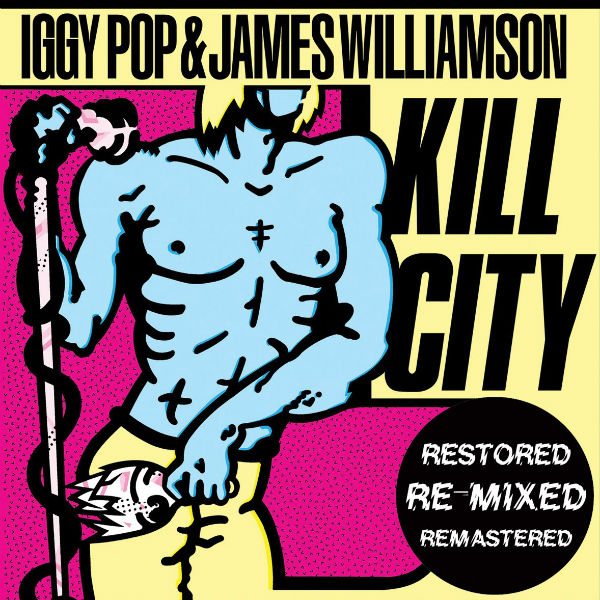Words by Taylor Hobson
Kill City, the 1977 album recorded by soon-to-be former Stooges Iggy Pop and James Williamson in the limbo between the Stooges’ disbandment and the Pop’s influential solo career, is somewhat of a rock anomaly. What inflates the intrigue behind this reissue is the key moment that it marks between the Stooges and Iggy Pop.
As far as a comparison to solo Iggy Pop, which this album at least chronologically preludes, few songs on Kill City reach the balance of originality and punk accessibility that the artist later attained. Here, “Consolation Prizes” and “Kill City” probably hint most directly at the perfect combination of straightforward grit and experimental space later found in “Lust for Life.” An important detail to keep in mind is the difference between actively seeking the avant-garde and simply not pigeonholing yourself into a preconceived notion of what instruments and speed punk requires: Kill City exhibits that sense of leaving room for experimentation, but the progressive elements could be polished down with more subtlety.
The album’s most surprising quality is how clearly identifiable these experimental elements are. In short, Pop and Williamson create a dark, moody environment by not rushing the pace of any one song and, simply put, adding a whole lot of saxophone and piano.
The center chunk, from “I Got Nothin’” to “Johanna” and the instrumental interlude “Night Theme,” provides Kill City’s best and most characteristic moments. The masterful control and use of tempo shines in “I Got Nothin’”; “Johanna” seethes, and its piano-trill/saxophone duel that closes the song exemplifies how strong a role the two instruments take on the entire album. Other songs (e.g., “Beyond the Law”) come across a little too much like low-grade Stooges punk with tons of sax. And, from our retrospect, that’s when it’s hardest shake the Hall & Oates or “Night Court Theme” feel.
If nothing else, Kill City demands respect with its impressive consistency, and it’s an interesting precursor to Iggy Pop’s solo career of almost crooning punk. However, put in light of an analogous and contemporary shift from influential band frontman to solo career, Kill City has nothing on Lou Reed’s Transformer, which nails every sensation and tone for which it strove, creating one of the best albums of all time as it did so. But maybe that’s not fair, since The Velvet Underground and Lou Reed are just proportionally important and groundbreaking figures in general than The Stooges and Iggy Pop.
And so it’s the disarmingly simple, direct, and easily identifiable elements that make this album relevant in the history of Pop Music despite its “long lost” mythos, which is vastly important in an age where the iPod’s portable encyclopedia has just as much effect on music creation as its consumption.
To simplify it, the heavy-handedness of the saxophone is actually the album’s saving grace, the dominant regulator of the mood and sound that keeps this album from being lost completely between punk and Pop.
“Kill City”
Alive Records
© October 19th, 2010
iggypop.com
TheWaster.com | Stooges
10.19.10



